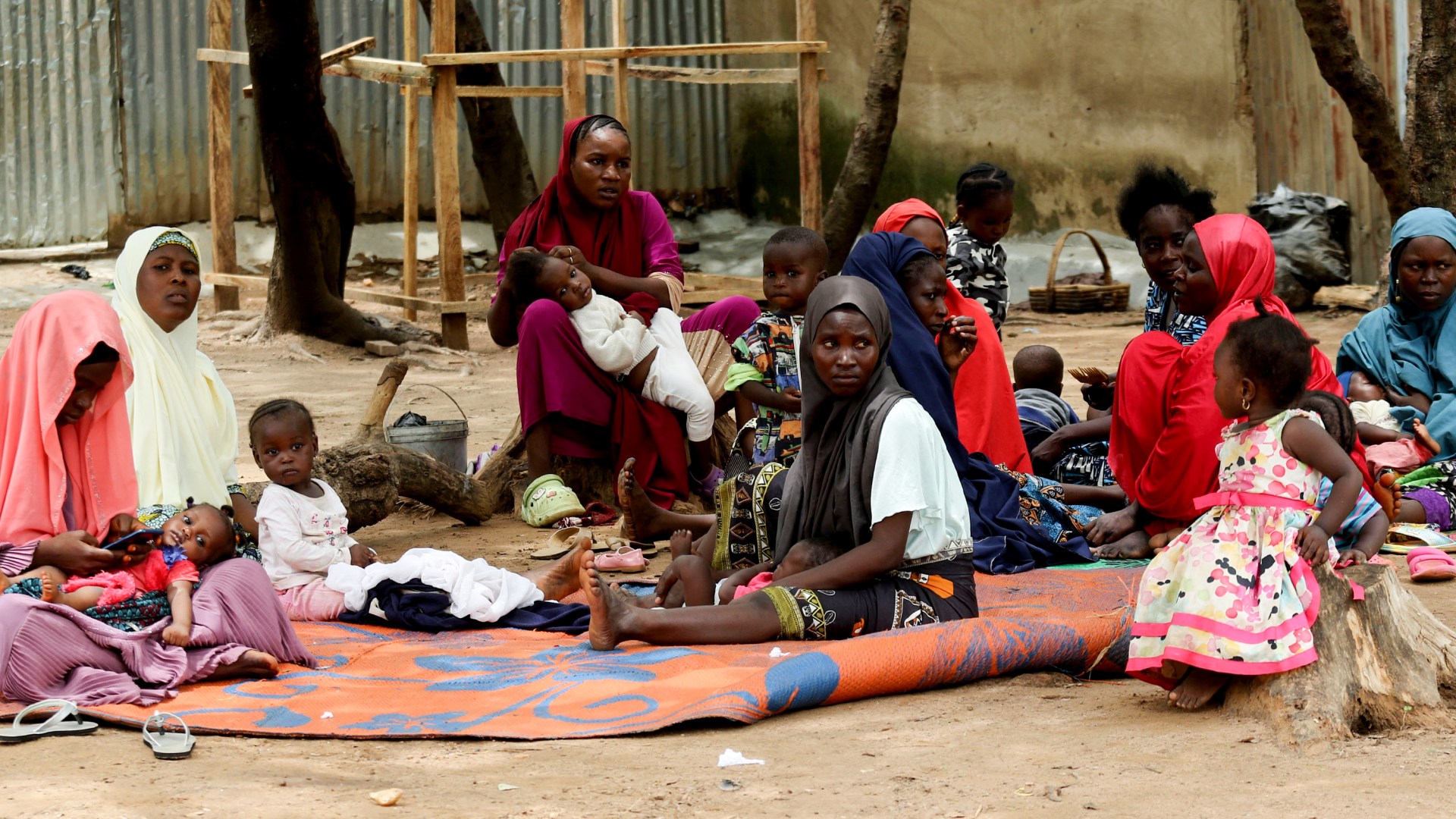Each morning, Jennifer Abraham wakes up before dawn, her breath visible in the chill morning breeze. She picks up her worn wooden broomstick and dustpan to tidy three 15-by-20-foot classrooms, where 500 children ages 6 to 12 will cram in for the day’s lessons. They are in Durumi camp, one of the 18 makeshift shelters set up for Internally Displaced Persons (IDPs) in Abuja, Nigeria. Forty-year-old Abraham stoops as she sweeps plastic bags, crumbs, and dried mud from under old desks and wobbly chairs. “This is how I survive and feed my family,” she said.
In the sprawling Durumi camp, residents face harsh living conditions. Half-roofed, poorly maintained apartments leave the camp’s 2,900 residents exposed to heat and rain—the aftermath of a partial demolition of Durumi in late 2022. The children are thin, their skin pale and fragile from malnutrition. Safe water can come at a cost, and residents scrape by with meager resources.
“There is not enough to go around,” Abraham said.
The lack of toilets forces residents to defecate in the open, putting them at risk for health hazards like cholera and diarrhea. With more than 3.3 million IDPs reported to live in Nigeria, camps like Durumi struggle to meet residents’ basic needs.
Survival in the camps may become even harder for IDPs like Abraham as United Nations aid organizations begin to pull out of Nigeria due to slashed budgets and as US foreign aid cuts create uncertainty among nonprofits. Funding from Nigeria’s National Emergency Management Agency has also dried up.
Under-Secretary-General Tom Fletcher of the UN’s Office for the Coordination of Humanitarian Affairs warned in a letter of “a wave of brutal cuts” driven by a nearly $60 million funding shortfall for 2025. Meanwhile, Nigeria’s government is attempting to make up for a drop in health aid from the United States by approving $200 million in health-related spending. In 2023, the US provided more than $600 million in health aid.
Local foundations in Nigeria, such as Buni Yadi and Betharbel, can’t keep up with growing needs. The continued influx of people fleeing Boko Haram attacks—as well as giving birth within the camps—puts extra pressure on already-stretched resources.
Abraham remembers life before Durumi—when funding shortfalls didn’t threaten survival. She grew up in Nigeria’s northeastern state of Adamawa surrounded by vibrant traditional celebrations and bustling markets. She married Abraham Musa, an Ascot Petroleum Company employee, and built a family with four children—Susan, Margaret, Favour, and Miracle (now 21, 19, 17, and 13, respectively)—in Gwoza, a town in the neighboring state of Borno.
Their lives took a sudden turn when Boko Haram insurgents attacked Gwoza and its surrounding towns in 2014. The insurgents abducted women and children, burned houses, shot and killed hundreds of civilians, and pursued escapees into the bush.
“We left everything behind,” Jennifer Abraham recalled. “Women ran with their babies on their backs. Families were scattered, and some were never united again. For days we hid under trees in the bush, sometimes sneaking into nearby houses to quickly prepare a meal.”
Abraham and her family spent weeks on the run, fleeing hundreds of kilometers away to Durumi. She thought they would rebuild their lives there, but tragedy struck in August 2015 when a group of unidentified men ambushed her husband near the camp. He died in National Hospital Abuja five days later.
“Fleeing Gwoza was painful. But losing my husband was worse. He was my strength in this camp,” she told Christianity Today.
Since then, Abraham has frequently changed jobs—doing everything from trading to cooking to cleaning—to provide for her children and pay for their education. Two of her daughters have graduated from high school and are waiting for college.
“Whenever I feel like giving up, I remember my children,” she said. “My life is more meaningful because of them.” After her husband died, her children became her source of strength. But sometimes even that strength is threatened.
Health care has always been minimal. Nurses and doctors from nonprofits paid periodic visits to the camps with drugs and immunizations for babies. Now their visits have almost disappeared.
In early April, Favour fell ill with malaria, a life-threatening disease common in the camp’s mosquito-infested environment. The hospital turned her away after learning Abraham couldn’t pay the fees.
“I couldn’t afford the drugs this time,” Abraham said. She watched her sick daughter at home, praying for her recovery.
Like many others in the camp, Abraham worries about the loss of resources and how to rise above life in the camp. She doesn’t expect to return home to Gwoza since Boko Haram insurgents continue to attack communities in northern Nigeria. But Abraham said she is determined to leave the camp someday and build a happy home her husband would be proud of.
“I don’t know when,” she said, “but soon, God help me. Soon.”













